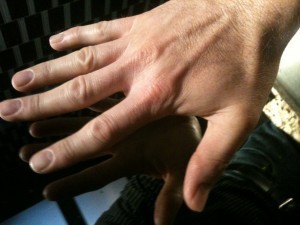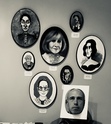This Week in Word of the Day – 06/09/2013
automaton \aw-TOM-uh-ton, -tn\, noun:
1. a mechanical figure or contrivance constructed to act as if by its own motive power; robot.
2. a person or animal that acts in a monotonous, routine manner, without active intelligence.
3. something capable of acting automatically or without an external motive force.
She designed the child not to leave. Not to grow, not to age, not to love, not to explore, not to wander, and not to need another companion aside from her. She even resisted giving the automaton a pet fish because she so feared the loss of his love.
And the boy knew it could not leave her. If he strayed thirty feet from her house, his mechanical mind would blink out and he would collapse, lifeless, until she came to retrieve him.
The boy seemed happy to her, or something close enough to happy. She caught him gazing out the window often, and it unnerved her.
“What is so darn interesting out there?” she would grumble with no attempt to hide her brittle emotions.
“Nothing, mother,” the boy would respond, still searching. Always searching.
zither \ZITH-er, ZITH-\, noun:
a musical instrument, consisting of a flat sounding box with numerous strings stretched over it, that is placed on a horizontal surface and played with a plectrum and the fingertips.
When the 23 members of Satan’s Orchestra walked onstage carrying 12 electric guitars, a full brass section, marching band drums, two xylophones and a zither, Charles knew he choose the right stage at the Norman Music Festival.
hadal \HEYD-l\, adjective:
1. of or pertaining to the greatest ocean depths, below approximately 20,000 feet (6500 meters).
2. of or pertaining to the biogeographic region of the ocean bottom below the abyssal zone.
The whispers started calling Hugh in his deepest sleep, barely registering, yet leaving him with a lingering unease when he woke in the morning.
It would take months before he became acutely aware that something was reaching out to him.
It followed him onto the deep sea fishing vessel and haunted him with increasing urgency as he left the land behind.
On a lonely night, Hugh sang well-tread, whiskey-soaked ballads as the whisper seemed so present, he almost felt its breath on his ear.
He looked down into the waves, peering into the bottomless, black water and knew that the whisper was calling from the hadalic depths, buried under a mountain of ocean where humans could not reach.
But he must.
The whisper called with more urgency. He felt fingertips gliding across his cheeks, guiding him forward, over the rail and down into the abyss.
He doesn’t remember the splash, he doesn’t remember the terrible chill, he just remembers the sinking, the sinking, the sinking.
trachle \TRAH-khuh\, noun:
1. an exhausting effort, especially walking or working.
2. an exhausted or bedraggled person.
verb:
1. to fatigue; tire; wear out.
2. to bedraggle.
Ailsa’s three day trachle nearly killed the girl, but she refused to rest until she untangled the beast from the fishing net. With the last cord severed and the net pulled free of Nessie’s massive flippers, the legendary creature crawled, spent and starved, back into the waters of Loch Ness.
Nessie left so unceremoniously, without even a glance goodbye, that Ailsa could not help but suffer a wounded heart. Yet, she was now the protector of a grand secret. She’d known the mysterious beast, she’d bathed Nessie’s soft hide to keep it from drying in the summer sun, she looked into her eyes as she fed the monster over 100 fish in the time she was trapped on the beach.
Those eyes, those wonderful pools of blue speckled with flakes of silver and gold! Ailsa would dream of those eyes all the days of her life, yet she would never see Nessie again.
As death neared, Ailsa insisted on her ashes being spread in the waters of Loch Ness and, in her final sleep, she felt her body tossed into the cold, peaceful waves. She felt herself settle beneath and, out of the shadowy depths, those beautiful blue eyes emerged like lanterns lighting the way home.
abdicate \AB-di-keyt\, verb:
1. to give up or renounce (authority, duties, an office, etc.), especially in a voluntary, public, or formal manner: King Edward VIII of England abdicated the throne in 1936.
2. to renounce or relinquish a throne, right, power, claim, responsibility, or the like, especially in a formal manner: The aging founder of the firm decided to abdicate.
Do not fool yourself, my Lord, your willing abdication of the throne will be your greatest feat. If you stay, if you deny the will of the people, they will forget your resolution as the barbarians beat at our gates, they will ignore the wealth you brought, the schools and the hospitals you built.
They will only remember your tyranny.
If you do not walk out that door, remove the crown and bow to the next generation of power, then you will be pulled out like a common leper. All the sacrifices you have made, all the advances in science and philosophy will melt away and they will hate you for your weakness, the most despicable weakness for a great leader – the foolish belief that they need you more than they need freedom.
trousseau \TROO-soh, troo-SOH\, noun:
an outfit of clothing, household linen, etc., for a bride.
Back before the fire rained from the sky, Ashley cared deeply about the complex ceremonies of weddings, obsessing over its symbology, traditions, and the cultural deviations. At one time or another, she married everything in her life, the salt to the pepper, the dog to the fish, the couch to the love seat, her baby brother to the vacuum cleaner.
But, at twelve, the first storm approached from the horizon just minutes before the dawn. The eery, blood orange glow flashed with a violent electrical storm. As it swept across the plans, coating the land with flaming ash, the cities were left as scorched ruins and the survivors fled underground while scientists scrambled to understand and counteract God’s fury.
Ashley thought little of weddings and nothing of luxury for years as she combed through the ruins above ground, looking for supplies or toiled away in cavernous fields of vegetables genetically modified to grow in the artificial light.
When a clever and bold young man finally asked for her hand in marriage, she was stunned and hesitated, believing it selfish to think of happiness in the face of so much loss. A week passed and the lovers avoided one another as she agonized.
Her father finally interceded, encouraging Ashley to consider the union, not just for herself, but for her people desperate for a connection to their lost civilization.
They married at the foothills of the Rockies, where wind patterns buffeted the sparse forest from the fire storms. It was one of the few green places left on the surface.
Ashely planned on wearing a simple, white, dust-stained cocktail dress, but her father unveiled a trousseau stashed in a steamer trunk complete with a lush, flowing wedding dress and delicate veil so intricate with fine lace that Ashley adeptly appraised the ensemble at $20,000. Where her father found the dress and the stacks of pristine linens, she would never know.
As she said “I do”, with her small town of survivors ignoring the glowing storms on the horizon, she could not remember a wedding in all the magazines more perfect and beautiful.
Well, maybe Princess Diana’s, but that was only because Ashely didn’t have access to a carriage.
wonk \wongk\, noun:
1. a stupid, boring, or unattractive person.
2. a student who spends much time studying and has little or no social life; grind.
3. a person who studies a subject or issue in an excessively assiduous and thorough manner: a policy wonk.
I understand that you may see me as a wonk, a drag to your too-goddamn-cool-party life, but I love music, okay? I love how mysterious it is, as deep and alive as the sea. I see the way you look at my house and I can explain the way I sort my albums – filed under feeling rather than name, and yes, that makes more sense than it sounds – and I can recount every single song that refined my soul, including when and where it was recorded and what the songwriter was doing when he wrote it. Rehab, mostly.
But I can’t make you care about music like I do. I get that and it’s okay. I guess what I am saying is – Christ, I can’t believe I am about to say this – you make me want to listen to Hall and Oates. I won’t listen to Hall and Oates because I hate Hall and Oates. Well, no one really hates Hall and Oates, not in the way you hate Hitler or … sporks, I guess. But I would rather be caught hanging from my neck in a hotel room with my pants around my ankles like Michael Hutchence than buy/steal/borrow/or find on the side of the road a Hall and Oates album, yet that is all I can think about now that you’ve crashed my life.
So, thank you for that. Honestly. I know I don’t talk well as a romantic or whatever, but thank you.




